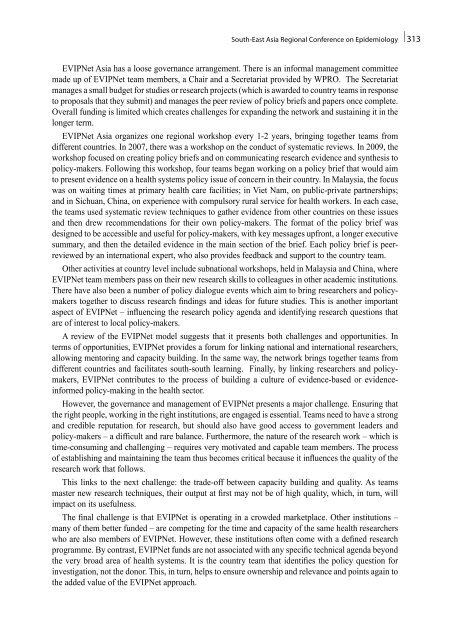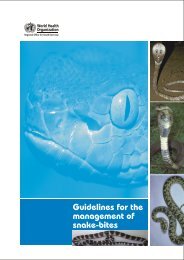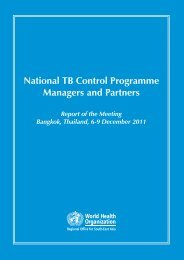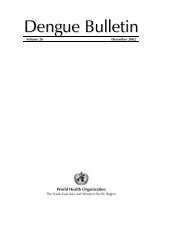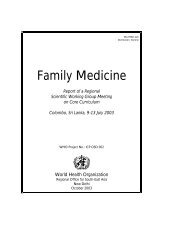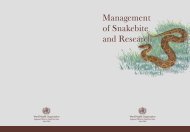South-East Asia Regional Conference on Epidemiology
South-East Asia Regional Conference on Epidemiology
South-East Asia Regional Conference on Epidemiology
Create successful ePaper yourself
Turn your PDF publications into a flip-book with our unique Google optimized e-Paper software.
<str<strong>on</strong>g>South</str<strong>on</strong>g>-<str<strong>on</strong>g>East</str<strong>on</strong>g> <str<strong>on</strong>g>Asia</str<strong>on</strong>g> <str<strong>on</strong>g>Regi<strong>on</strong>al</str<strong>on</strong>g> <str<strong>on</strong>g>C<strong>on</strong>ference</str<strong>on</strong>g> <strong>on</strong> <strong>Epidemiology</strong> | 313<br />
EVIPNet <str<strong>on</strong>g>Asia</str<strong>on</strong>g> has a loose governance arrangement. There is an informal management committee<br />
made up of EVIPNet team members, a Chair and a Secretariat provided by WPRO. The Secretariat<br />
manages a small budget for studies or research projects (which is awarded to country teams in resp<strong>on</strong>se<br />
to proposals that they submit) and manages the peer review of policy briefs and papers <strong>on</strong>ce complete.<br />
Overall funding is limited which creates challenges for expanding the network and sustaining it in the<br />
l<strong>on</strong>ger term.<br />
EVIPNet <str<strong>on</strong>g>Asia</str<strong>on</strong>g> organizes <strong>on</strong>e regi<strong>on</strong>al workshop every 1-2 years, bringing together teams from<br />
different countries. In 2007, there was a workshop <strong>on</strong> the c<strong>on</strong>duct of systematic reviews. In 2009, the<br />
workshop focused <strong>on</strong> creating policy briefs and <strong>on</strong> communicating research evidence and synthesis to<br />
policy-makers. Following this workshop, four teams began working <strong>on</strong> a policy brief that would aim<br />
to present evidence <strong>on</strong> a health systems policy issue of c<strong>on</strong>cern in their country. In Malaysia, the focus<br />
was <strong>on</strong> waiting times at primary health care facilities; in Viet Nam, <strong>on</strong> public-private partnerships;<br />
and in Sichuan, China, <strong>on</strong> experience with compulsory rural service for health workers. In each case,<br />
the teams used systematic review techniques to gather evidence from other countries <strong>on</strong> these issues<br />
and then drew recommendati<strong>on</strong>s for their own policy-makers. The format of the policy brief was<br />
designed to be accessible and useful for policy-makers, with key messages upfr<strong>on</strong>t, a l<strong>on</strong>ger executive<br />
summary, and then the detailed evidence in the main secti<strong>on</strong> of the brief. Each policy brief is peerreviewed<br />
by an internati<strong>on</strong>al expert, who also provides feedback and support to the country team.<br />
Other activities at country level include subnati<strong>on</strong>al workshops, held in Malaysia and China, where<br />
EVIPNet team members pass <strong>on</strong> their new research skills to colleagues in other academic instituti<strong>on</strong>s.<br />
There have also been a number of policy dialogue events which aim to bring researchers and policymakers<br />
together to discuss research findings and ideas for future studies. This is another important<br />
aspect of EVIPNet – influencing the research policy agenda and identifying research questi<strong>on</strong>s that<br />
are of interest to local policy-makers.<br />
A review of the EVIPNet model suggests that it presents both challenges and opportunities. In<br />
terms of opportunities, EVIPNet provides a forum for linking nati<strong>on</strong>al and internati<strong>on</strong>al researchers,<br />
allowing mentoring and capacity building. In the same way, the network brings together teams from<br />
different countries and facilitates south-south learning. Finally, by linking researchers and policymakers,<br />
EVIPNet c<strong>on</strong>tributes to the process of building a culture of evidence-based or evidenceinformed<br />
policy-making in the health sector.<br />
However, the governance and management of EVIPNet presents a major challenge. Ensuring that<br />
the right people, working in the right instituti<strong>on</strong>s, are engaged is essential. Teams need to have a str<strong>on</strong>g<br />
and credible reputati<strong>on</strong> for research, but should also have good access to government leaders and<br />
policy-makers – a difficult and rare balance. Furthermore, the nature of the research work – which is<br />
time-c<strong>on</strong>suming and challenging – requires very motivated and capable team members. The process<br />
of establishing and maintaining the team thus becomes critical because it influences the quality of the<br />
research work that follows.<br />
This links to the next challenge: the trade-off between capacity building and quality. As teams<br />
master new research techniques, their output at first may not be of high quality, which, in turn, will<br />
impact <strong>on</strong> its usefulness.<br />
The final challenge is that EVIPNet is operating in a crowded marketplace. Other instituti<strong>on</strong>s –<br />
many of them better funded – are competing for the time and capacity of the same health researchers<br />
who are also members of EVIPNet. However, these instituti<strong>on</strong>s often come with a defined research<br />
programme. By c<strong>on</strong>trast, EVIPNet funds are not associated with any specific technical agenda bey<strong>on</strong>d<br />
the very broad area of health systems. It is the country team that identifies the policy questi<strong>on</strong> for<br />
investigati<strong>on</strong>, not the d<strong>on</strong>or. This, in turn, helps to ensure ownership and relevance and points again to<br />
the added value of the EVIPNet approach.


